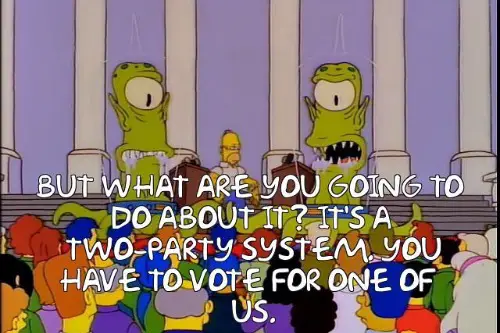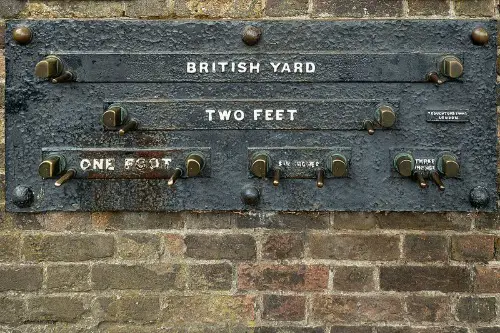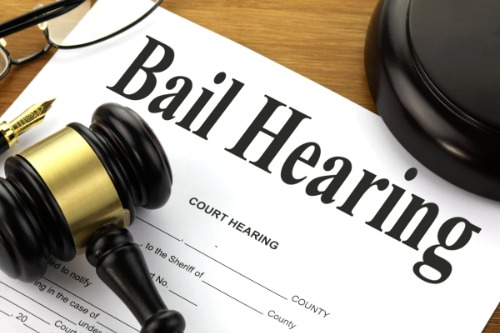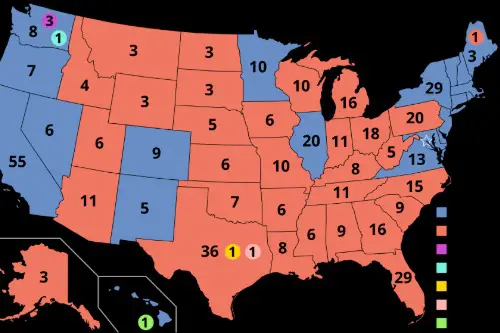1. Keeping the Two-Party System on Lock

The U.S. loves to talk about freedom of choice—except when it comes to political parties. The dominance of Democrats and Republicans makes it nearly impossible for third-party or independent candidates to gain traction. Ballot access laws, debate rules, and media coverage all tilt the field. It’s not just tradition; it’s systemic exclusion.
Most Americans say they want more choices, but the system doesn’t allow it. People end up voting “lesser evil” rather than what they truly believe. And any challenge to the duopoly is treated like sabotage. Deep down, everyone knows more voices would make democracy healthier—but no one wants to give up power.
2. Tipping Instead of Paying Workers a Living Wage

America clings to tipping like it’s a patriotic duty, even though it started as a way to avoid paying newly freed Black workers after the Civil War. In most states, tipped workers earn as little as $2.13 an hour before tips, and their income depends on the kindness—or mood—of customers. It also introduces unnecessary awkwardness at the end of a meal, and often disproportionately rewards or punishes workers for things they can’t control. Other countries pay servers fair wages, and restaurants still manage to survive.
This system also creates a breeding ground for harassment and discrimination, particularly toward women and people of color. It’s no secret that tipping can reinforce biases—studies show attractive or white servers often make more. Despite that, efforts to reform or replace the system are constantly met with resistance. Because deep down, Americans fear paying full price up front, even if it’s the right thing to do.
3. Keeping Daylight Saving Time

Twice a year, Americans collectively agree to mess up their sleep schedules for a tradition that nobody really likes. Originally intended to conserve energy during wartime, studies now show the energy savings are negligible at best. In fact, the disruption causes an increase in heart attacks, car accidents, and workplace injuries. And yet, here we are, still springing forward and falling back like clockwork.
Several states have voted to ditch the time change, but federal law prevents them from making it permanent without approval. So we’re stuck in this half-hearted limbo where everyone complains, but nothing changes. It’s the kind of inertia that only bureaucracy could sustain. And until Congress decides to care, your circadian rhythm will just have to suffer.
4. Using Imperial Units

The United States is one of only three countries still using the imperial system. Inches, feet, and gallons may feel familiar, but they make no sense to most of the world—or even to most Americans when you really think about it. Scientists, doctors, and the military already use metric because it’s easier and more precise. But everyday folks still measure in football fields and soda cans.
Why? Because changing signs, textbooks, recipes, and brain muscle memory feels too overwhelming. There was an attempt in the ’70s to make the switch, but it fizzled out due to public resistance. Now it’s mostly a punchline that’s also a national policy. Admit it: if someone says something is “25 degrees Celsius,” you still have to Google it.
5. Allowing Health Insurance to Be Tied to Employment

In most developed countries, health care is a public service, not a perk you hope your job includes. The U.S. system links insurance to employment, which means losing your job often means losing access to doctors, prescriptions, or life-saving treatment. This setup made even less sense during the COVID-19 pandemic when millions lost both income and coverage simultaneously. It’s a fragile and deeply stressful way to manage public health.
The origin goes back to World War II-era wage caps, when employers used health insurance to attract workers. But instead of correcting that weird workaround, it became the norm. And even though employer-based insurance leaves out the unemployed, gig workers, and many part-timers, it’s still the dominant model. Mostly because change feels scary—even when the current system is clearly broken.
6. Using Paper Checks

Paper checks feel like they belong in a museum, but Americans still write billions of them each year. Many landlords, small businesses, and even government agencies insist on checks, even though faster, more secure options exist. They’re a pain to mail, easy to lose, and a goldmine for identity thieves. But somehow, they’ve survived the digital age.
Part of the reason is that checks feel “official” or “safe” to some people, especially in older generations. But banks process them digitally anyway, making the paper part redundant. Meanwhile, countries like Sweden and the Netherlands are almost entirely cashless. Yet the U.S. keeps mailing rent in envelopes like it’s 1985.
7. Requiring Job Applicants to Have College Degrees for Non-Specialized Roles

A four-year degree is often treated as a golden ticket, even for jobs that don’t require college-level skills. Roles like administrative assistants, sales reps, and even some entry-level tech jobs often list a bachelor’s as a bare minimum. That’s led to degree inflation, where education is valued more for gatekeeping than actual relevance. It also shuts out capable people who can’t afford college.
Plenty of employers are starting to drop the degree requirement, realizing experience and skills matter more. But the inertia of HR practices and corporate templates means the degree filter persists. It’s a form of credentialism that disproportionately affects marginalized groups. Still, many companies would rather exclude great candidates than question the system.
8. Keeping the Penny

It costs nearly three cents to make a one-cent coin. That’s not just ironic—it’s economically absurd. Pennies clog up change drawers, waste time at checkout, and almost never get used for actual purchases. Other countries like Canada and Australia have already phased out their smallest coins without issue.
Americans, however, cling to the penny like it’s part of the national identity. Maybe it’s the image of Lincoln, or maybe it’s just fear of change—literally. Despite bipartisan efforts in Congress to get rid of it, the penny persists. And so does the tiny, metallic drain on the U.S. Mint’s budget.
9. Allowing Unlimited Campaign Spending

The Supreme Court’s Citizens United decision in 2010 opened the floodgates for unlimited political spending by corporations and super PACs. The idea was that money equals free speech—but in practice, it means billionaires and special interest groups can drown out regular voters. Every election since has gotten more expensive and more divisive. Candidates now spend more time fundraising than legislating.
Despite widespread public frustration with the role of money in politics, reform efforts stall repeatedly. Politicians benefiting from the system are unlikely to bite the hand that feeds them. It’s a bad idea masquerading as constitutional purity. But admitting it would mean admitting our democracy has a price tag.
10. Using Plastic for Single-Use Items

Despite knowing the environmental damage plastic causes, the U.S. still produces and uses mountains of it—especially for items used once and tossed. Plastic bags, straws, and utensils are handed out like candy, even though most aren’t recyclable. They end up in landfills, oceans, and even our bloodstreams. Yet we act like it’s someone else’s problem.
Some cities and states have enacted bans or fees, but there’s no national standard. Industry lobbying and consumer convenience stall meaningful change. People grumble about “wokeness” when asked to use a paper straw. But keeping the status quo means choking the planet in slow motion.
11. Selling Prescription Drugs with TV Commercials

The U.S. is one of only two countries that allow direct-to-consumer pharmaceutical ads on TV. You’ve seen them—scenic walks in the park, a soft voice reading terrifying side effects, and the suggestion to “ask your doctor.” These ads encourage people to request specific drugs, even when alternatives or no medication at all might be better. They turn health care into a marketplace rather than a collaboration.
Doctors report feeling pressured to prescribe name-brand drugs due to patient demand. Meanwhile, drug companies spend billions on advertising, passing the cost on to consumers. The system prioritizes profits over patient care, plain and simple. But since networks love the ad revenue, and politicians love pharma donors, the cycle continues.
12. Electing Judges

In many states, judges run political campaigns like any other public official. That means raising money, shaking hands, and sometimes promising outcomes they shouldn’t. The idea was to make the judiciary accountable to the people, but it often undermines judicial independence. Campaign contributions from lawyers and special interests create obvious conflicts of interest.
In theory, judges are supposed to be neutral arbiters of the law. But when they rely on donations to stay in office, public trust erodes. The American Bar Association and many legal scholars agree this is a bad idea. Still, few are willing to admit the system might be more political than just.
13. Using Bail for Nonviolent Offenses

In many parts of the U.S., people charged with minor crimes sit in jail for days or weeks—not because they’re guilty, but because they can’t afford bail. The system punishes poverty and creates a two-tiered justice system. Rich defendants walk free while poor ones lose jobs, housing, and even custody of children. This isn’t hypothetical—it happens every day.
Bail reform has started in some states, but it faces constant backlash. Critics argue it makes communities less safe, despite little evidence to support that claim. Meanwhile, private bail bond companies rake in profits. Admitting the system is broken would mean admitting we’ve been punishing the poor for being poor.
14. Using the Electoral College

The Electoral College is one of those archaic systems that few people really understand but fiercely defend. It was originally created to appease slave states and has led to five presidents winning without the popular vote. This creates a weird situation where some voters in swing states have way more power than others. And if democracy is supposed to reflect the will of the people, this system kind of breaks that promise.
Every election cycle, critics come out swinging, but serious reform never happens. Partly because changing it would require a constitutional amendment, and partly because the parties benefiting from it don’t want to let go. It’s not just a quirky tradition—it’s actively warping national politics. And everyone knows it, but admitting it would shake the foundation of how we elect leaders.
15. Treating Mental Health Like a Luxury

In the U.S., therapy and psychiatric care are often expensive, hard to access, or stigmatized. Insurance may cover only a few sessions—or none at all—and waitlists for public services can be months long. Meanwhile, mental health issues like anxiety, depression, and addiction are on the rise. But we still treat mental health as something extra, not essential.
The irony is that untreated mental illness costs the economy billions in lost productivity and health complications. Many people suffer in silence because help feels out of reach or shameful. We’ve made strides in awareness, but not in access. And until we stop pretending it’s a luxury, people will keep falling through the cracks.
This post 15 Things the U.S. is Still Doing Just Because Nobody Wants to Admit It’s a Bad Idea was first published on American Charm.


